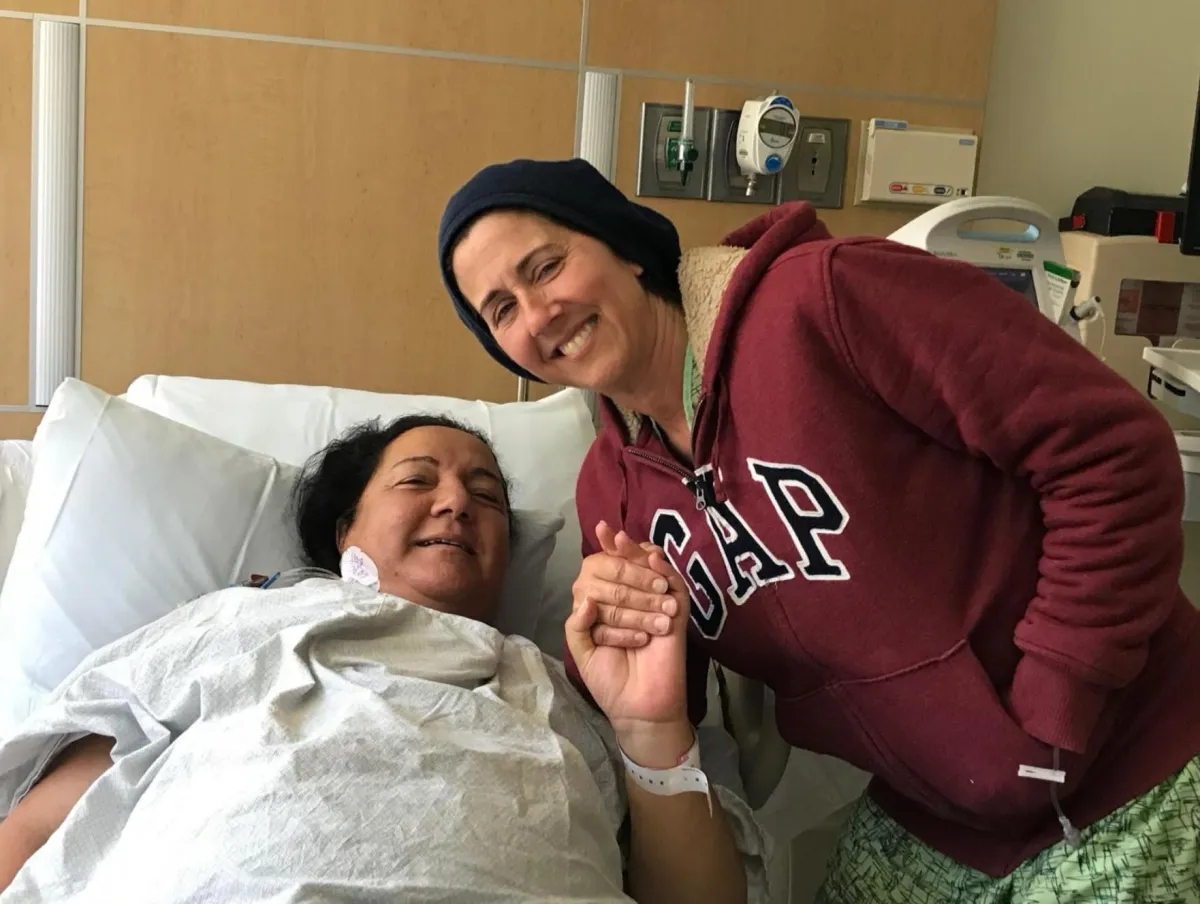TZIPPY TIVON: Kidney Recipient Story of Gratitude

My name Tzippy and I am the extremely grateful receipient of Rochel Smoller's kidney.
How has receiving a kidney transplant has changed your daily routine and overall quality of life?
Receiving a kidney transplant has profoundly altered both my daily routine and my overall quality of life. Prior to the transplant, my life revolved around dialysis sessions, which I endured three times a week for three and a half hours each. These sessions extended even longer if my blood pressure was low, delaying my return home or to work. I felt like I was merely existing rather than living, as my body was slowly deteriorating and I was constantly tired. The physical toll was immense, and it left me emotionally drained as well. I couldn't travel or engage in many activities, which made it seem like work and dialysis were the only constants in my life. Now, post-transplant, I no longer need dialysis, and I've regained the freedom to live a more normal and fulfilling life.
What were the most significant emotional and psychological adjustments you had to make after receiving the kidney transplant?
After receiving the kidney transplant, the most significant emotional and psychological adjustments stemmed from the drastic changes in my health and capabilities. Just two weeks before the surgery, I was in a near-coma state, and my condition was dire. However, the transformation post-transplant was immediate and profound. On the very first day after surgery, I felt like a completely different person; it was as though I could do anything. Notably, the color returned to my face, signaling a renewed vitality that made me feel genuinely happy and alive for the first time in a long while.
Despite my low blood pressure and the initial challenges of starting to walk again, I found myself surprisingly pain-tolerant. In the hospital, the nurses encouraged me to use morphine for pain management, but I discovered I did not need it. This resilience was surprising, especially considering my previous battle with breast cancer and chemotherapy, which had significantly affected my kidney function.
Just five days after the operation, I was able to go home from the hospital. This rapid recovery and the sudden shift from severe illness to recuperation required significant psychological adjustment. Emotionally, it was a journey from feeling near death to embracing a life full of possibilities again, demanding a reevaluation of my life’s potential and priorities.
How did you navigate the uncertainties and challenges during the kidney transplant process, and what kept you motivated?
Navigating the uncertainties and challenges during the transplant process was a formidable task that required a great deal of resilience and support. Initially, I was placed on the donor list at Sharp Hospital, filled with optimism about the prospect of receiving a transplant. There was emotional upheaval, particularly when I was informed by the hospital that a potential donor was not a match. This news was disheartening and represented a significant setback.
During these challenging times, I sought the support of a therapist who played a crucial role in helping me cope with the disappointment and maintaining my mental health. The emotional guidance provided by the therapist was instrumental when grappling with the "no" responses, helping me to process the information and continue moving forward despite the setbacks.
How has your relationship with your kidney donor evolved post-transplant?
Post-transplant, my relationship with my donor, Rochel, has evolved into a remarkably close and supportive bond. We have grown very close, and she affectionately refers to me as her sister, a testament to the deep connection we've developed through this life-changing experience. We communicate regularly, sharing our lives and supporting each other just as any close family members would.
Rochel's commitment to raising awareness about kidney donation extends beyond her personal act of kindness toward me; she has also participated in a TEDx talk, advocating for and supporting kidney donors. Her efforts to educate others about the importance of donation and the impact it can have on recipients' lives demonstrate her incredible compassion and dedication. Her involvement in these advocacy efforts is truly amazing, and it has only deepened the respect and affection I hold for her. Our relationship is a source of strength and joy for both of us, profoundly influenced by the life-saving gift she has given me.
Reflecting on your transplant experience, what insights or lessons have you gained about resilience and coping with adversity?
From kidney failure to kidney transplant made me realize the brevity and preciousness of life, teaching me invaluable lessons about resilience and coping with adversity. One of the most important insights I've gained is the significance of living life to the fullest, no matter the circumstances. This means engaging deeply with the simple, everyday activities that define regular life, such as traveling to see family and enjoying the moment without constantly worrying about the future.
An additional lesson came from handling the emotional aspects of my health struggles, particularly in relation to my family. For instance, I was initially reluctant to worry my mother with the details of my health issues and impending surgery. I only told her just before the operation, which, although it shocked her, meant she had only a short time to worry. Thankfully, the surgery was successful, and my mother was relieved and happy with the outcome. This experience taught me about the delicate balance of protecting loved ones from distress while also sharing important life events with them. It highlighted how resilience is not just about enduring adversity oneself but also involves managing the emotional journey of those around you.
How has your support system (family, friends, healthcare team) contributed to your recovery and adaptation to life post-transplant?
The support from my family—my children and husband—alongside the broader community, kept me motivated and hopeful. Their encouragement and the shared belief that a suitable match would eventually be found helped sustain me through the uncertainties of the transplant process. Their support was not just emotional but also practical, as they assisted in managing the daily challenges and maintaining a sense of normalcy while I awaited a donor match.
Have there been any unexpected positive outcomes or new perspectives that emerged from your transplant experience?
The transplant experience has indeed brought several unexpected positive outcomes and new perspectives that have enriched my life significantly. One of the most transformative aspects has been a shift in my approach to life and interactions with others. I've learned to live without judging others, choosing instead to focus on what truly matters. This mindset has helped me avoid getting entangled in unnecessary conflicts or distractions, and I've become more conscious about not wasting time on things that don't add value to my life or to the lives of others.
As an educator teaching various grades from kindergarten through middle school, I've recognized the importance of being a positive role model for my students. The resilience and gratitude I've gained from my transplant journey have enhanced my ability to teach these values through example. By sharing my experiences and the lessons learned, albeit in an age-appropriate manner, I can inspire my students to appreciate life, embrace challenges, and support others. This role has become even more significant post-transplant, as I feel a renewed commitment to impact the young lives I'm responsible for, guiding them with empathy and strength.
Can you discuss any lifestyle changes you've embraced since receiving the kidney transplant and their impact on your well-being?
Since receiving the transplant, I've made significant lifestyle changes that have had a profound impact on my overall well-being, particularly considering the need to maintain a healthy immune system due to medication suppressing it. One of the most notable adjustments has been to my diet. To support my health and the function of the transplanted kidney, I've adopted a diet that focuses on whole foods and avoids sweets and carbohydrates. Instead, I prioritize vegetables, fish, nuts, eggs, and some cheese, following a Mediterranean-style eating pattern known for its heart-healthy benefits and emphasis on fresh, nutrient-rich foods.
Regular physical activity has also become a cornerstone of my lifestyle post-transplant. I've incorporated long walks into my daily routine, which not only contributes to my physical fitness but also serves as a form of relaxation and stress relief. These walks allow me to connect with nature, clear my mind, and appreciate the simple joys of life.
These lifestyle changes have had a positive impact on my well-being, helping me maintain optimal health and support the longevity of the transplanted kidney. By prioritizing nutritious eating and regular exercise, I not only take proactive steps to safeguard my physical health but also cultivate a sense of empowerment and control over my own well-being.
Looking back, what advice would you offer to others awaiting a kidney transplant or considering becoming donors?
First and foremost, I would encourage them not to lose hope and to maintain a positive outlook throughout their journey. The wait for a transplant can be challenging and uncertain, but maintaining optimism and resilience can make a significant difference in coping with the process.
Also, I would recommend spreading the word about their need for a transplant and connecting with organizations and support networks that can offer assistance and guidance. Social media can be a powerful tool for reaching out to a wide audience and garnering support from friends, family, and even strangers who may be willing to help in any way they can.
For those considering becoming organ donors, I would express heartfelt gratitude and emphasize the profound impact their decision can have on someone's life. Becoming a donor is a selfless act of kindness that has the potential to save or significantly improve the lives of others. By choosing to donate, individuals can truly become saviors and make a lasting difference in the lives of those in need.
Finally, I would echo the importance of embracing a healthy lifestyle post-transplant, including regular physical activity and nutritious eating habits. Taking care of one's physical and mental well-being is essential for supporting the longevity of the transplanted organ and enjoying a fulfilling life after transplantation.
My advice basically centers around hope, positivity, advocacy, gratitude, and self-care, all of which are crucial elements in navigating the transplant journey and embracing life to the fullest extent possible.
Note: Tzippy's story was dictated and edited with gpt language model.



